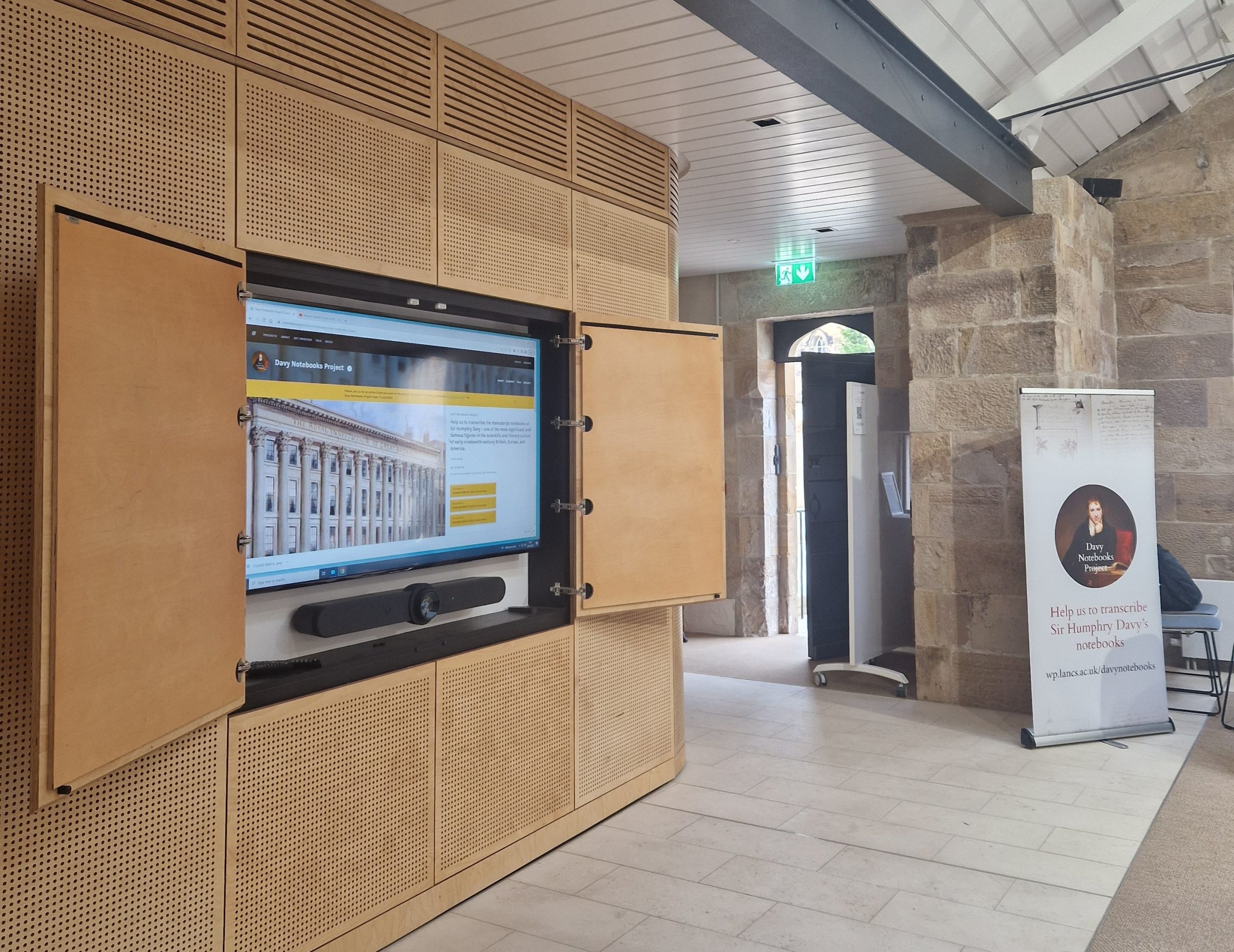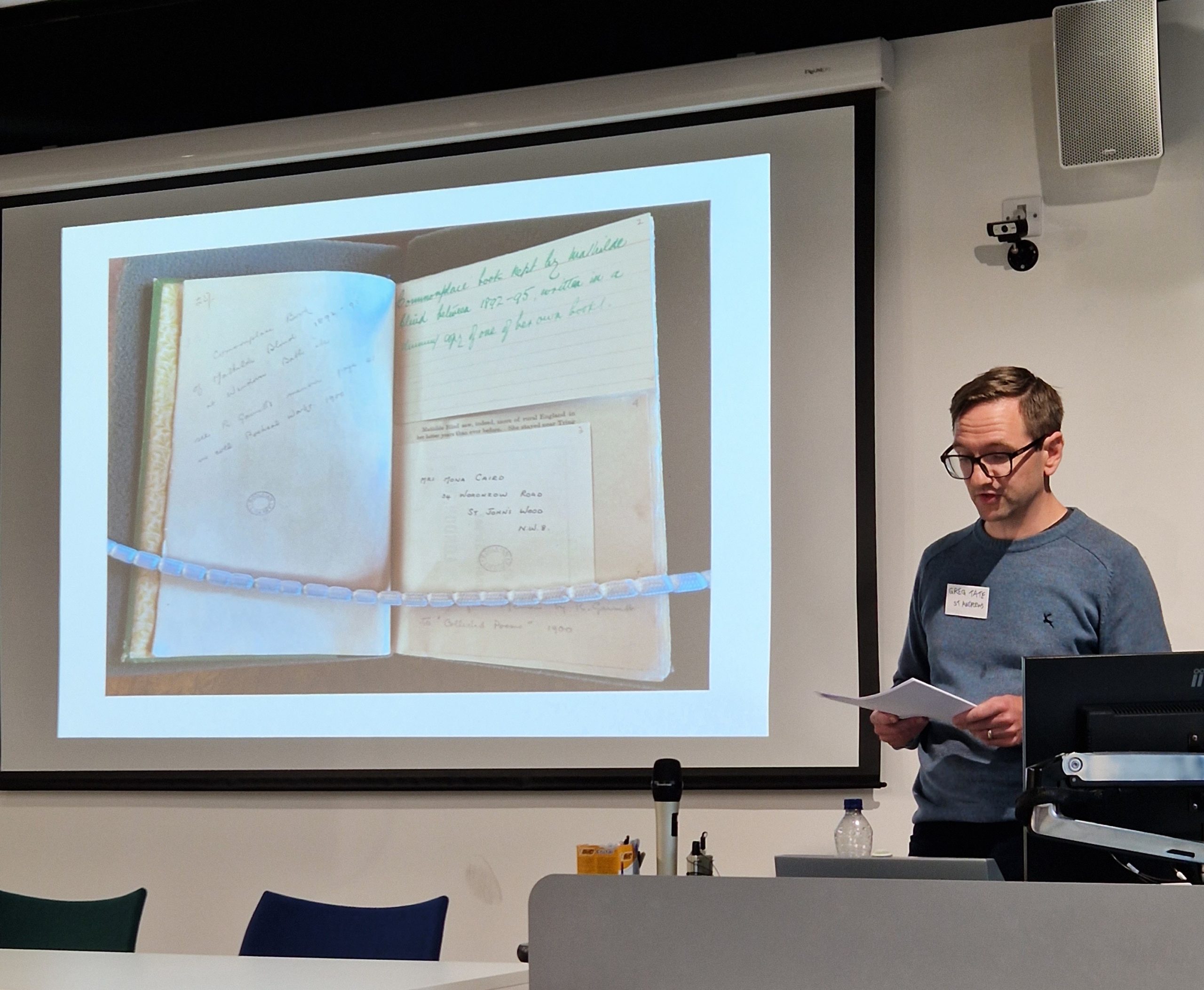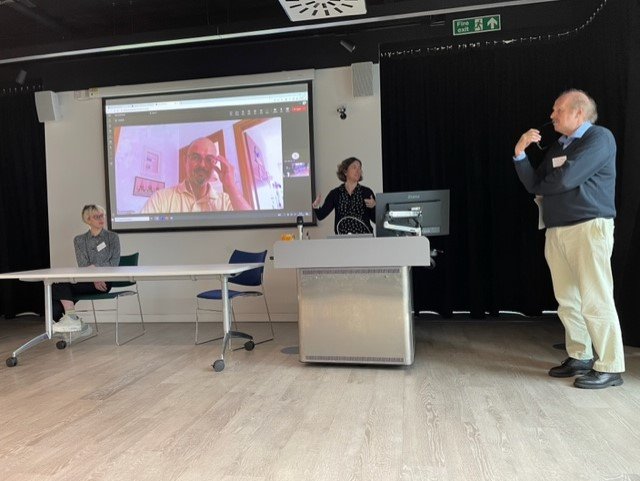Science and/or Poetry: Interdisciplinarity in Notebooks
Lancaster University
26-27 July 2023

In late July, more than two dozen international scholars of the arts and sciences came together for ‘Science and/or Poetry: Interdisciplinarity in Notebooks’, a conference organised by the Davy Notebooks Project team and held in Lancaster.
The conference theme was inspired by our efforts to digitise and interpret Humphry Davy’s notebooks, a goal which we, along with our volunteers, have been working towards since the project’s beginning. Taking what we’ve learned from Davy’s notebooks as a starting point, we broadened the scope of our call for papers to examine how literature and science have interacted within the pages of notebooks across difference disciplines and historical periods. We were delighted by the diversity of approach and areas of study in the abstracts we received, a range that was reflected in the fascinating papers we heard over the course of our two-day meeting.
The first day of our conference took place at beautiful Lancaster Castle. We began with an excellent morning discussion centring on interdisciplinarity, poetry, and science in notebooks. The first panel examined Coleridge’s complex notebooks, considering the power of touch and materiality, dream records, incomplete readings, and more. Our second group of speakers explored poetics, scientific experimentation, demonstration, and the evolution of interdisciplinarity in notebooks of Davy, Berzelius, Coleridge, and Mach. The third panel covered fascinating projects focusing on collaboration and outreach in the arts and sciences, including contributions from The Lyell Project and The Science Museum, as well as a member of own project team speaking on the Davy Notebooks Project Reading Group.
To end the first day, we listened to a brilliant keynote by Greg Tate on Mathilde Blind’s 1890s notebook, which included consideration of Victorian ideas of waste and raised thought-provoking questions about the use and meaning of notebooks. This spurred interesting conversations that we carried over to our conference dinner on campus.

The second day of the conference was held in the Digital Scholarship Lab in the Library, which is linked with Lancaster Digital Collections, one of our project partners and the future host of the digital editions that will result from our project. The first group of panel speakers considered the form of institutional collections, methods of learning and training in notebooks, and the relationship between biography and the form of author notebooks, with a focus on Sloane’s herbarias, eighteenth-century Scottish school notebooks, and Davy’s early life. Our second panel explored a huge range of notebook practices from the eighteenth century to the Victorian period through the twentieth century, with excellent discussions of artistic skill, the systemisation of lifelong writing, and fragmentary posthumous archives in the notebooks of Gerald Manley Hopkins, Thomas Gray, and Sara Teasdale.
Before lunch, members of the Davy Notebooks Project Team came together to present a Roundtable on the forthcoming Notes and Records of the Royal Society Special Issue, which will focus on findings from the project. Conference delegates as well as virtual participants engaged in discussion about the papers within the special issue, offering useful ideas to the team. The last panel looked at collaborative or shared notebooks in both the Romantic and Victorian periods, which led to interesting discussions on interventions, authorship, and legacy in the shared notebooks of Mary Coleridge, Edward Ellerker Williams, and Edward John Trelawny. Our final part of the conference was a wonderful and wide-ranging lecture from our second keynote, Dahlia Porter, speaking on experimental notebooks and the embodied labour underpinning scientific and procedural processes in notebooks, by delving into the complex notebooks of the Wedgwood Collection. Dahlia’s paper resulted in a lively Q&A discussion, which capped a brilliant day of exchanging ideas.

Over the course of the conference, several intersecting themes emerged. These included considering how interdisciplinarity might spur creativity in both the arts and sciences. We collectively reflected on the intimacy of working with notebooks as well as the various layers of mediation and touch that manuscripts can transmit over time and to different individuals, whether researchers, or archivists, or members of the public. We discussed the value of notebooks as texts in themselves, and whether they can and should be read on their own merits rather than mining them as source documents for later publications or scientific discoveries. We talked about the powerful influence held by institutions over the interpretation of manuscripts, which they are often the first to categorise, actions which have a lasting impact on how they are encountered by future readers in terms of disciplinarity. Finally, we considered the importance of literary and scientific collaboration in notebooks as well as the silent labour of workers that may underpin the writing or experiments captured within their pages.
We are grateful to all of our participants for joining us in Lancaster and sharing their insightful papers. The ideas we took away from the event will surely resonate through our future work on the Davy Notebooks Project and beyond.
Summary by Alexis Wolf